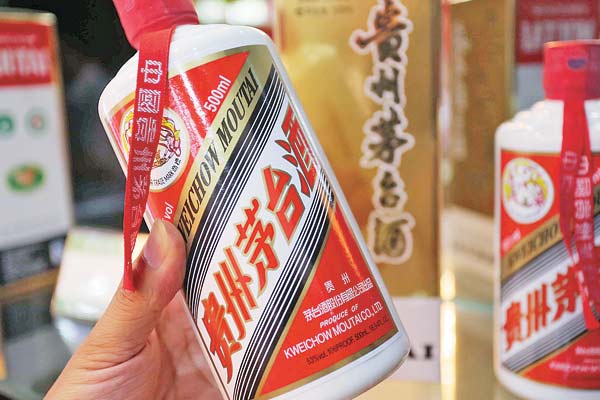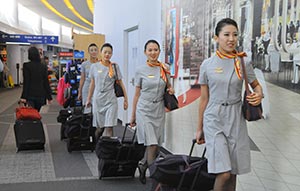

Investigations part of overall enforcement of anti-monopoly law
An official at China's top economic planning body said antitrust investigations aren't targeting foreign companies but are instead part of an overall effort at tougher enforcement of the anti-monopoly law.
Six infant formula makers, five of them foreign, were fined for price-fixing and anti-competitive practices earlier this month. It's been reported that the vehicle and pharmaceutical industries are also being investigated, raising concerns among companies over what industry will be the next target of antitrust investigators.
 |
|
In June, domestic premium liquor makers Kweichow Moutai Co Ltd and Wuliangye Yibin Co Ltd were fined a total of 449 million yuan ($71.3 million) by the National Development and Reform Commission for resale price maintenance. [Provided to China Daily] |
"Most investigations result from public tip-offs and there is no intention of targeting a specific type of companies … we treat domestic and foreign companies equally," said Xu Kunlin, director-general of the Department of Price Supervision under the National Development and Reform Commission.
He reiterated the regulator's determination to enforce the antitrust law.
"Any company that violates the law will be thoroughly investigated, no matter what kind of enterprise it is," Xu said on Sunday during an interview with the State broadcaster, China Central Television.
Investigations in other sectors are underway, but it's too soon to release details due to the complexity of enforcing the anti-monopoly law, an NDRC official who declined to be identified told China Daily.
"There is no such a thing as specially targeting foreign companies. Our investigations focus on monopolistic conduct, not the entities behind it," the official said.
Recent high-profile antitrust cases have reminded companies to comply with China's anti-monopoly law, said Huang Yong, deputy head of the expert advisory group of the State Council's Anti-monopoly Committee, in an interview with China Daily.
"To avoid potential legal risks, all companies doing business in China, foreign and domestic, should ensure their compliance with the anti-monopoly law," said Huang.
Five foreign milk powder producers were fined a total of $110 million for violating the law for entering into contracts with distributors to ensure a minimum sales price, according to the NDRC.
"These companies might not act like that in their own countries because generally, such behaviors also present grave legal risks in Western countries," said Huang.
The infant formula case was the second case filed by the NDRC against setting floor prices for items resold to third parties, also called resale price maintenance. That's the most common form of vertical price-fixing.
In June, domestic premium liquor makers Kweichow Moutai Co Ltd and Wuliangye Yibin Co Ltd were fined a total of 449 million yuan ($71.3 million) by the NDRC for resale price maintenance.
Legal experts said similar vertical price fixing also exists in the auto and pharmaceutical sectors, where companies are in danger of violating the law.
In the United States, a requirement by a manufacturer that a distributor sell the manufacturer's product at a certain price is no longer automatically illegal under the federal antitrust law, but it is still automatically illegal under the laws of some US states and the laws of other Western jurisdictions, said Steven Cernak, counsel of law firm Schiff Hardin LLP.
"So Western companies still know to be careful about such practices ... I don't know if the infant formula companies were not as careful as they should have been or if some of their actions were misinterpreted," said Cernak.
"Companies doing business in China must take anti-monopoly compliance seriously ... foreign firms must be careful about the anti-monopoly law, like they are about the antitrust laws and competition laws in so many of the other countries in which they operate," he said.
 Models at Ford pavilion at Chengdu Motor Show
Models at Ford pavilion at Chengdu Motor Show
 Brilliant future expected for Chinese cinema: interview
Brilliant future expected for Chinese cinema: interview
 Chang'an launches Eado XT at Chengdu Motor Show
Chang'an launches Eado XT at Chengdu Motor Show
 Hainan Airlines makes maiden flight to Chicago
Hainan Airlines makes maiden flight to Chicago
 Highlights of 2013 Chengdu Motor Show
Highlights of 2013 Chengdu Motor Show
 New Mercedes E-Class China debut at Chengdu Motor Show
New Mercedes E-Class China debut at Chengdu Motor Show
 'Jurassic Park 3D' remains atop Chinese box office
'Jurassic Park 3D' remains atop Chinese box office
 Beauty reveals secrets of fashion consultant
Beauty reveals secrets of fashion consultant